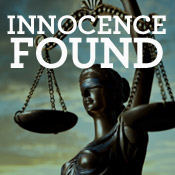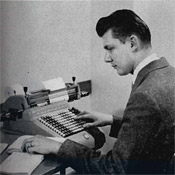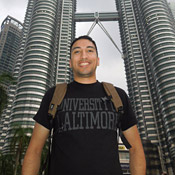Innocence Found
Category: WebExtras
UB’s Innocence Project Clinic Aids Wrongfully Convicted Marylanders
In fall 2010, then-law students Emily Dubick, J.D. ’11, and Brian Bishop, J.D. ’11, worked together through UB’s Innocence Project Clinic on Larry Lane Hugee’s wrongful imprisonment case, drafting the post-conviction petition that stated he received “ineffective assistance of counsel” during his trial and pointing out testimony and evidence concerns.
Reacting to Hugee’s release:
Dubick: It is exciting and gratifying to know that work we did as law students helped change a man’s life and the lives of his family. The successful outcome solidified the idea that this was not another class or series of assignments; the Innocence Project Clinic has real, lasting effects on people and the justice system.
Bishop: I feel ecstatic for [Hugee]. I can’t even imagine what he feels like!
Putting law school in perspective:
Dubick: I think the clinic puts law school in perspective. You are constantly studying and reading, but we sat across from a man in prison who was relying on us to get all the facts straight and [to] help him get his freedom back. Yes, tests and papers are important, but I think the experiences you can get from a clinic show you why you study the rules, exceptions and case law.
Bishop: [You have to] be prepared. It’s about working up the facts and getting it right. Even in the smallest cases, put your best foot forward.
Gaining firsthand experience:
Dubick: The Innocence Project Clinic was my first choice then, and I would choose it again. In college, I saw a documentary about the Innocence Project, which sparked my interest in the program. I thought their work was amazing and wanted to be a part of it. I started at [the UB School of Law] hoping I would be able to do [the clinic] at some point during my three years there. I was determined from the start to participate, and I am grateful to have had the opportunity to do so.
Bishop: Just learning from [Michelle Nethercott, director of UB’s Innocence Project Clinic, and Stephen Harris, former co-director of the Innocence Project Clinic] was great. A lot of the techniques they taught us I use in my practice even now. [They taught us] to just line up the witnesses and see what vibes and what doesn’t. I think it’s given me a big leg forward. I have experience that puts me at the level of someone who’s been doing this for three or four years.
A parting word:
Dubick: I would highly recommend doing a clinic. Even if you cannot find one that grabs you right off the bat, the lessons you learn and practical experience you gain makes it worthwhile, and you might even find a passion or ability for an area of law that you hadn’t thought about previously. Even though I am not doing criminal defense work now, I don’t regret the real-world lawyering experience of the Innocence Project Clinic for one second.
Bishop: Get as much real-world experience as possible. And don’t forget to network. Go out there and get as much practical experience as possible. It will make you a better attorney.





